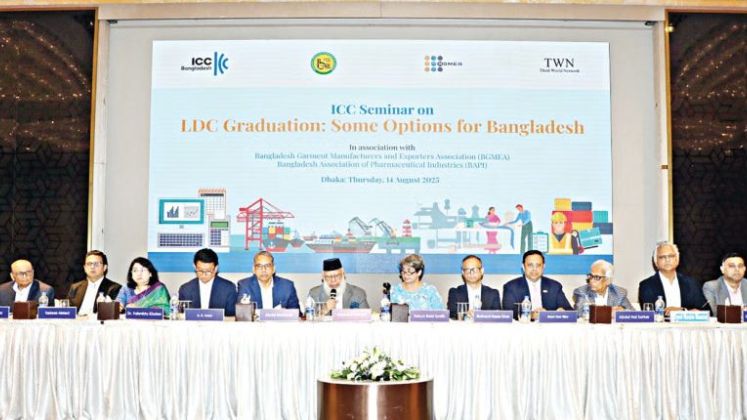
Business leaders have cautioned against celebrating the recent US tariff reduction, warning that it is premature and could lead to complacency. Speaking at a seminar titled LDC Graduation: Some Options for Bangladesh organised by ICC Bangladesh in Dhaka on 14th August, Syed Nasim Manzur, former president of the Metropolitan Chamber of Commerce and Industry (MCCI), said the reduced rate would only matter once it is clear what tariffs competitor countries will face.
Manzur, who also heads the Leathergoods and Footwear Manufacturers and Exporters Association, noted that Bangladesh is already losing competitiveness while Vietnam and India benefit from free trade agreements with the EU and the UK. He further highlighted that Bangladesh continues to bear some of the highest shipping costs in the world, alongside unprecedented political and economic shocks.
The United States, after months of negotiations, lowered tariffs on Bangladeshi products from 37% to 20% on 31st July, though further talks are expected. Finance Adviser Salehuddin Ahmed earlier hinted that there may still be scope for additional reductions. Dhaka Chamber of Commerce and Industry (DCCI) President Taskeen Ahmed echoed caution, saying negotiations are far from over and competitors like India may ultimately secure even lower rates, leaving Bangladesh disadvantaged.
Concerns were also raised about Bangladesh’s scheduled graduation from Least Developed Country (LDC) status in November 2026. Several speakers warned that moving too quickly could be “suicidal” for the economy. Former FBCCI president AK Azad argued that the fragile state of the economy, rising defaulted loans now estimated at Taka 5.30 lakh crore, and widespread requests for loan rescheduling from around 1,200 factories all indicate that Bangladesh is not yet prepared. He warned that graduation would increase tariffs on Bangladeshi goods in key markets, by up to 12% in the EU, 16–18% in Canada, and 7–12% in Japan leading to factory closures and export losses. While the government expects graduation to attract more foreign investment, Azad questioned this assumption given the ongoing gas crisis and weak industrial capacity.
BGMEA president Mahmud Hasan Khan Babu similarly warned that the ready-made garment sector, the country’s main export earner, would struggle to remain competitive against Vietnam, Cambodia, and India if graduation goes ahead as scheduled. He stressed that uninterrupted electricity supply remains unmet, and at least two to three more years are needed to meet industrial demand.
Policy experts also urged caution. Fahmida Khatun, executive director of the Centre for Policy Dialogue (CPD), said graduation should not be pursued as a matter of pride or ego. She warned that among 12 graduating countries, Bangladesh would face the steepest losses, with 90% of trade losses falling on its economy because of its heavy reliance on preferential market access. She also criticised the interim government for relying on foreign consultants, questioning the sidelining of local expertise.
The keynote paper, delivered by researcher Sanya Reid Smith of the Third World Network, argued that Bangladesh could still delay graduation, pointing to examples like Botswana and Cambodia. Nasim Manzur suggested 2032 as a more realistic target year, stressing that critical infrastructure such as a deep-sea port must be in place before the transition.






